
Original Link: https://www.anandtech.com/show/4255/puget-systems-deluge-mini
Puget Systems Deluge Mini: The Art of Custom
by Dustin Sklavos on April 5, 2011 4:15 PM EST- Posted in
- Systems
- Intel
- Sandy Bridge
- GTX560
- Puget Systems
- NVIDIA
Introducing the Puget Systems Deluge Mini
The last time we checked in with Puget Systems, we came away impressed with their Serenity SPCR Edition. It wasn't the fastest machine we've ever tested, but it was extremely well put together and almost completely inaudible. With Sandy Bridge back on shelves, Puget sent along a custom gaming rig and just like the Serenity SPCR Edition, there's more to the Deluge Mini than meets the eye.
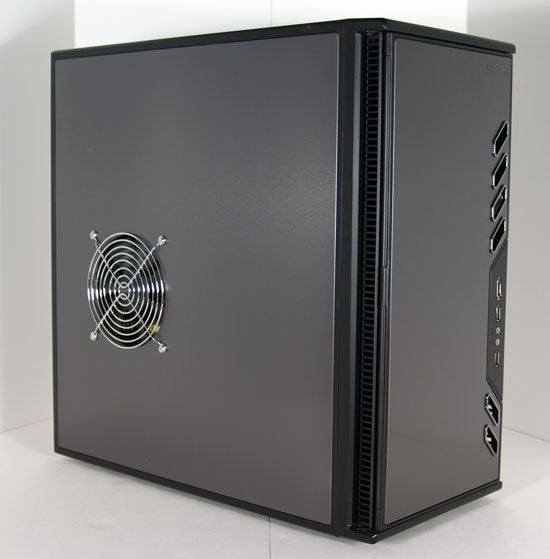
Puget Systems releases their gaming desktops under the Deluge line, and for our review they sent us a particularly intriguing entrant in the form of their Deluge Mini. While the Antec Mini P180 chassis that houses it may be built for Micro-ATX, the word "Mini" is fairly charitable. Still, it's definitely smaller than the larger tower cases we're used to seeing these gaming machines built in. As I mentioned, there's more going on with the Deluge Mini than initially appears. But before we get into the intricacies of the build, let's take a look at how our review unit was specced:
| Puget Systems Deluge Mini Specifications | |
| Chassis | Antec Mini P180 (Customized) |
| Processor |
Intel Core i5-2500K @ 4.5GHz (spec: 4x3.3GHz, 32nm, 6MB L3, 95W) |
| Motherboard | ASUS P8P67-M Pro Motherboard with P67 chipset |
| Memory | 2x4GB Kingston DDR3-1333 @ 1333MHz (expandable to 16GB) |
| Graphics |
2x EVGA GeForce GTX 560 Ti 1GB GDDR5 (384 CUDA Cores, 850/1700/1025MHz Core/ShadersRAM, 256-bit memory bus) |
| Hard Drive(s) | Western Digital Caviar Black 1TB SATA 6Gbps HDD |
| Optical Drive(s) | Lite-On BD-ROM/DVD+-RW Combo Drive |
| Networking | Realtek PCIe Gigabit Ethernet |
| Audio |
Realtek ALC892 HD Audio Speaker, mic, line-in, and surround jacks for 7.1 sound Optical out |
| Front Side |
Card reader 2x USB 2.0 eSATA Headphone and mic jacks Optical drive |
| Top | - |
| Back Side |
2x PS/2 2x USB 3.0 Optical out 6x USB 2.0 eSATA Ethernet Speaker, mic, line-in, and surround jacks for 7.1 sound |
| Operating System | Windows 7 Home Premium 64-bit |
| Dimensions | 8.3" x 17.2" x 17.1" (WxDxH) |
| Weight | 20.9 lbs (case only) |
| Extras |
Antec TP-650 650W Power Supply Asetek Liquid Cooling Case Modification Card Reader |
| Warranty |
1-year limited parts warranty and lifetime labor and phone support. 2- and 3-year extended warranties available. |
| Pricing |
Deluge Mini starts at $1,549 Review system configured at $2,257 |
The configuration our Deluge Mini review unit shipped with makes for an interesting comparison with the Origin Genesis we recently reviewed. Both are running with Sandy Bridge processors overclocked to 4.5GHz, though Puget Systems sticks with the Intel Core i5-2500K instead of bumping up to the Core i7-2600K. For most users (and especially the gamers Puget is targeting) this isn't going to be a major issue, with the chief differentiator being the i7's support for Hyper-Threading and an extra 2MB of L3 cache. Outside of that, both machines have 8GB of Kingston DDR3 strapped to the processor (though Puget opts to go for slower DDR3-1333.)
Origin and Puget also both elected to go with two of EVGA's mildly overclocked NVIDIA GeForce GTX 560 Ti graphics cards configured in SLI. A primary but crucial difference is in how the cards are spaced: because Puget is using a smaller case and confined to the Micro-ATX form factor, the two 560 Ti's are snuggled up next to each other, while Origin's tower gives them more breathing room.
A major difference, though, is the lack of an SSD in the Deluge Mini. This is disappointing, as review units from competing boutiques have included an SSD for the data drive as a matter of course, but it's also not a dealbreaker: you can still configure your build with an Intel SSD.
Which brings us to one vital point here: if you visit the Puget Systems site to build your own machine, you'll notice that the Intel SSDs are the only options. This is reflective of one of the quirks of Puget: while most boutiques are certainly concerned about reliability to a degree and happily stand behind their builds, Puget performs extensive reliability testing of hardware on the market and collects massive amounts of data (some of which I've actually been privied to see.) As a result, if they don't feel a particular component is going to be up to par or may cause issues down the line, they simply won't offer it. That puts their comparatively meager 1-year standard parts warranty into perspective: by trying to choose the most reliable parts to begin with, they're banking on the user never having to worry about the warranty to begin with.
Application and Futuremark Performance
The principal comparison we're going to want to make here is against Origin's Genesis. Origin includes an SSD in their review system which is going to wildly skew PCMark results in their favor, even more so than the i7-2600K running at an identical clock speed to the Deluge Mini's i5-2500K. When we get to gaming, we'll see the difference is negligible in practice, but for programs that are heavily multi-threaded (as our application suite is) the Hyper-Threading on the 2600K is liable to produce a moderate lead.






Our predictions are essentially proven correct here: PCMark skews wildly towards the SSD-equipped machines despite the i5-2500K being measurably faster than the previous generation i7's by no small margin. When we get to Cinebench and the x264 benchmark, Puget's 4.5GHz i5-2500K generally falls in right where we would expect it to (with the x264 pass 1 encode being oddly faster than the other systems). At some point it'll become less surprising how monstrously fast Sandy Bridge is, but I've played with six SB-based desktops at this point and each one still makes me want to throw my overclocked i7-930 out the window.




Given the way 3DMark's results can skew towards being CPU-limited by Sandy Bridge we're becoming increasingly less enamored with it. Independently as a reviewer I can tell you exactly how these configurations should be ordered in terms of gaming performance, and out of all four of these tests the only one that looks the closest to correct is 3DMark03. That flies in the face of "newer is better"; what do you guys think? Are these still useful or is there some change that should be made?
Gaming Performance
It's at this juncture that we'll get to see if the extra cache and Hyper-Threading on the i7-2600K has any noticeable impact on performance (comparing the otherwise identically-clocked Origin Genesis with Puget Systems' Deluge Mini). We'll aslo get a better look at how this comparatively inexpensive gaming configuration (two GeForce GTX 560 Ti's in SLI) fares against NVIDIA's flagship GeForce GTX 590.








In certain cases that were already CPU-limited, the extra logical cores on the i7-2600K seem to help, but it's at this juncture we should point out a vital difference in how these systems were tested. At our standard 1080p testing, the Origin Genesis was using NVIDIA's 267 series drivers while the Puget Deluge Mini used the older 266 driver; these machines were tested concurrently, and it was actually with the Deluge Mini that we discovered just how dire the situation was for NVIDIA Surround. On 266.66 Surround just plain didn't work, but we didn't discover this until after we'd completed our 1080p testing for the Deluge Mini.
When we went to test the Genesis, we updated to the beta 267 driver right off the bat, which is likely what's causing results in Metro 2033 and STALKER to skew somewhat. This is also a good time to remind you that all of our tests are run thrice to ensure variations are weeded out. Interestingly, the 266 driver actually ran substantially better in Metro 2033 at "High" than the updated 267 driver (and of course now there's a new 270 beta driver available).







I can't stress this enough: for many of these gaming machines, running at 1080p (even with anti-aliasing) the GPUs are overkill. The two GTX 560 Ti SLI systems essentially bunch up, with Hyper-Threading either producing a gain or taking its cut and the driver difference making its presence known in STALKER, where abnormally high results in the "Night" benchmark skew the average. Let's move to surround gaming to remove the CPU bottleneck.






Finally, our surround testing continues to show freakishly favorable results for the Origin Genesis in STALKER, while in every other test the systems essentially fall in line. This is really where multi-GPU solutions shine and we hope to continue adding to these results in the future, but it's also a crime that getting NVIDIA Surround to work properly is as fraught as we discussed in the iBuyPower LAN Warrior II review. Those issues occurred across the board on all of these systems.
Build, Noise, Heat, and Power Consumption
It's really amazing what a single 120mm fan can do. Build quality is really where the Puget Systems Deluge Mini soars above the competing gaming towers we've tested, just like the Serenity SPCR Edition before it. I've had the opportunity to talk to the CEO of Puget Systems, Jon Bach, about their build process and how they go about designing the machines they sell and this is a good place to get into it.
Before even powerinng on the Deluge Mini there are two things that should immediately come to the astute reader's attention: Puget opts to use the highly-regarded Antec Mini P180 enclosure for this gaming build, and the P180 doesn't typically have a side intake fan. The Mini P180 enjoys all the sound dampening and thermal qualities of its larger siblings in the P180 series, but Puget Systems modifies the case by adding a 120mm intake fan directly above the video cards. The modification is extremely neat and tidy and would go essentially unnoticed to anyone who wasn't already familiar with this chassis. One of Puget's major claims in their build process is the use of thermal imaging to detect hot spots in their builds and weed them out. Adding the intake fan may seem like a "well duh" in retrospect, but it still takes extra time and effort to make the modification and it pays big dividends as you'll see.
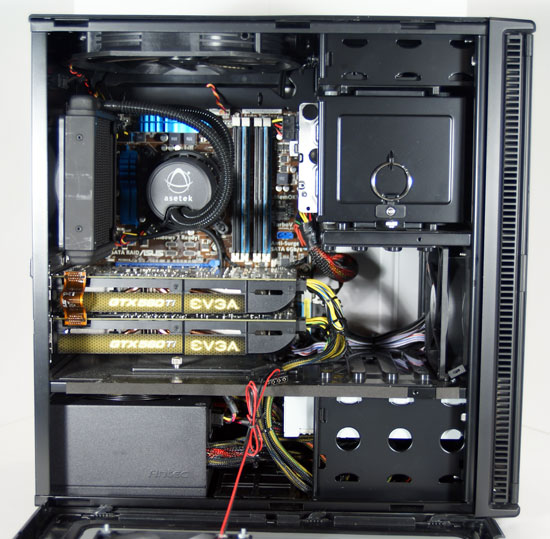
Because Puget opts to use the Mini P180 along with a reasonably quiet watercooling solution for the processor, noise is virtually a non-issue with the Deluge Mini. While it's true the video cards do spin up under load testing, this is still overall one of the quietest gaming desktops we've ever tested and it's here that Puget Systems ekes out their major victory in comparison with the Origin Genesis: despite using a smaller chassis with more cramped internals, the Deluge Mini offers comparable gaming performance with both better thermals on the CPU and much better acoustics. That may have something to do with Puget's decision to employ an i5-2500K instead of the i7-2600K, too; on Nehalem-generation processors, losing Hyper-Threading shaves a few degrees off the load temperature of the processor.
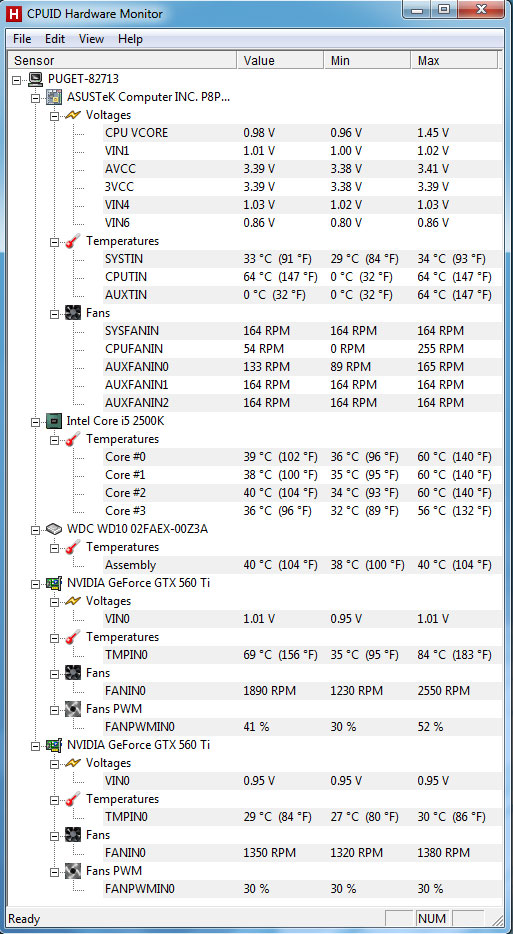
The GeForce GTX 560 Ti tandem runs a little toastier in the Deluge Mini, but it's far less audible, and the processor runs substantially cooler despite using comparable voltage to the Origin Genesis and a theoretically less robust cooling system. A visit to UEFI shows what's also the most thoroughly fine-tuned overclocking job we've seen on any boutique system. Offset and turbo voltages have both been carefully adjusted.
This shouldn't completely take away from the Origin Genesis; the i7-2600K in their review unit was fairly power hungry and their engineers did a solid job of tuning the overclock. Puget's build just seems to handle heat better overall.
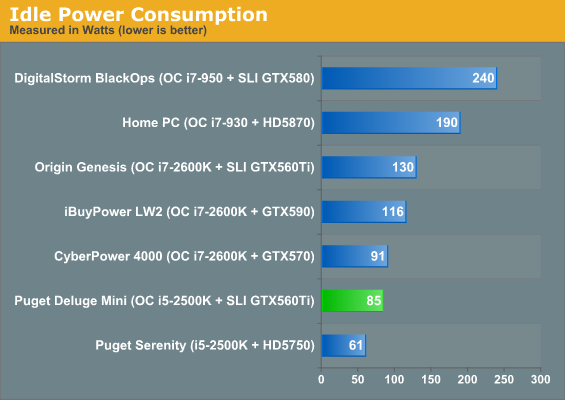
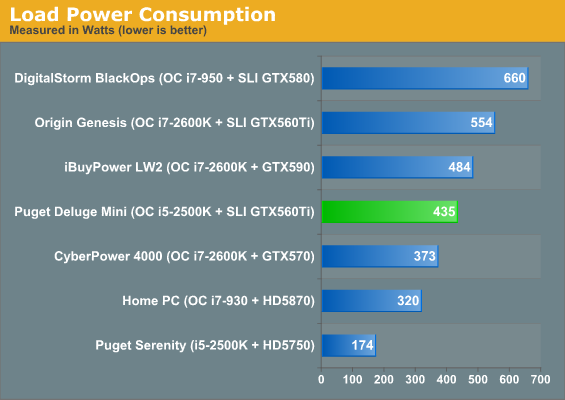
That fine-tuning really bears itself out in power consumption testing, where idle power is second only to Puget's own Serenity and load power remains very reasonable. Users concerned that the 650-watt Antec TruePower power supply might not be quite enough for this build should be satisfied to see it's got room to spare.
Conclusion: Worthy of Enthusiast Attention
One of the overarching issues that we run into in reviewing boutique desktop machines is understanding that many of you in our audience prefer to roll your own. It's at that juncture that we have to figure out what each boutique brings to the table that you just can't do on your own. I built my own tower, and the cabling may be kind of a mess behind the motherboard tray but ultimately it gets the job done well enough that I would have a hard time really justifying paying someone else to put the system together.
There's definitely a price to pay, as the components and OS add up to around $1600 if purchased online. Factor in the assembly and overclock and we're still several hundred dollars short of the final sticker price. While it's certainly possible to do all of the work and assembly yourself, as a one-stop enthusiast PC setup there's a lot of custom options to consider.
Puget Systems brings more to the table than any one of us can really achieve. I've had the privilege of looking at the extensive reliability testing they do on the components they use in their builds, and the fact is that very few of us have thermal imaging hardware required to get a really good idea of where the hot spots in our builds are. And then while I'm sure many of you own a dremel and wouldn't have any problem modding your cases, I don't. The Deluge Mini is a custom build of the highest order.
I hate to keep dragging Origin's Genesis out here because it's really an excellent machine, but the Deluge Mini is $300 less for near-equivalent performance in gaming, a smaller form factor, a more finely tuned overclock, and much better acoustics. Origin will give you the  overclock for free and they'll even do a pretty good job compared to some of the other boutiques, but Puget will spend more time and they'll build your machine with parts they've chosen expressly for their reliability. With that price difference you can grab an i7-2600K and an SSD and bring the Deluge Mini into complete performance parity with the Genesis.
overclock for free and they'll even do a pretty good job compared to some of the other boutiques, but Puget will spend more time and they'll build your machine with parts they've chosen expressly for their reliability. With that price difference you can grab an i7-2600K and an SSD and bring the Deluge Mini into complete performance parity with the Genesis.
When I was testing and photographing the Deluge Mini I was consistently of the opinion that as an enthusiast first and reviewer second, no, I couldn't do a better job than Puget Systems did with this build. Spending over two bills is still steep for buying a desktop computer, especially given how fast these things are obsoleted, but if you want something powerful, reliable, cool, and quiet, it's awfully hard to beat the Deluge Mini. For that it deserves our Bronze Editor's Choice award.













